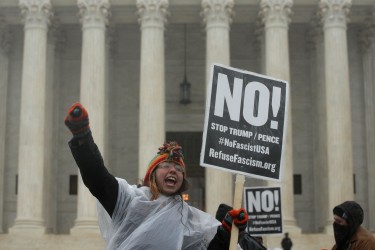The temptation to draw parallels between Trump and the fascist leaders of the 20th century is understandable. How better to express the fear, loathing and contempt that Trump arouses in liberals than by comparing him to the ultimate political evil? But few who have described Trump as a fascist can be called real experts in the field, not even Snyder. The majority of genuine specialists, including the historians Roger Griffin, Matthew Feldman, Stanley Payne and Ruth Ben-Ghiat, agree that whatever else he is, Trump is not a fascist.
Fascism and Nazism were the creation of the First World War, which militarised society and – in the minds of their leaders and supporters – discredited liberal democracy by associating it with armed defeat. In Germany, the defeat was catastrophic, entailing large territorial losses, the emasculation of the country as a great power, and the payment of huge financial reparations to the Allies. Italy was on the winning side in 1918, but the expected gains from banding together with Britain, France and the US failed to materialise, and the country left the war with what historians have called “the mentality of a defeated nation”.
What drove fascism and Nazism was the desire to refight the First World War, but this time to win it. Preparing for war, arming for war, educating for war and fighting a war defined fascist theory and praxis. Hitler’s aim of conquering territory was put into effect immediately in 1933, as he rearmed Germany and set it on a path to invade neighbouring countries. By mid-1940, Nazi Germany had conquered Poland, Austria, Czechoslovakia and most of western Europe. The Third Reich lived for war, breathed war and promoted war without limits. Similarly, Mussolini’s central aim was to create a new “Roman empire”, beginning with the conquest of Ethiopia in 1935-36 and continuing with less successful attempts to subjugate countries around the Mediterranean, disastrously in the cases of Yugoslavia, Greece and North Africa.
For all of Trump’s hostility towards countries he perceives as enemies of the US, notably Iran, there is no indication that he sought a war with any foreign power, still less that he has been consumed by a desire for foreign conquest and the creation of an American empire. He is an isolationist, busy withdrawing US troops from foreign adventures, from Syria to Afghanistan. “America first” is not about launching foreign wars but disengaging from them.












